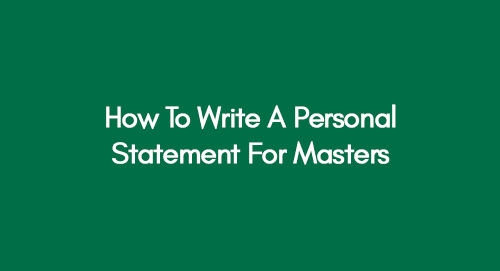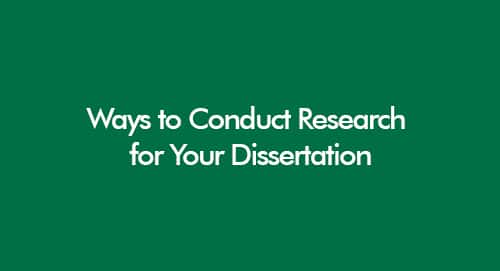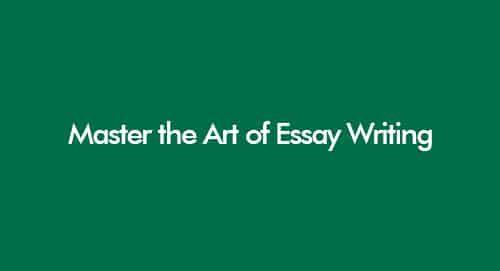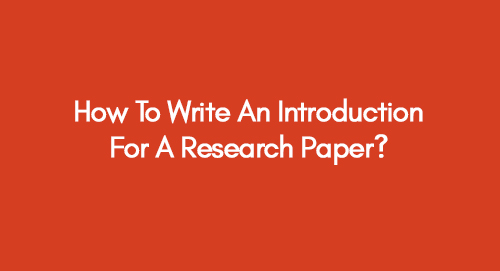
How To Write an Introduction for a Research Paper | Thorough Explanation
October 27, 2022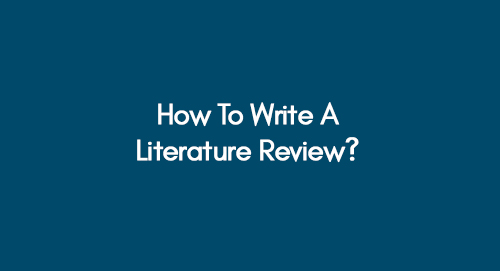
How to Write a Literature Review? | From Analysis to Synthesis
October 27, 2022A personal statement for a master's degree serves as a golden opportunity to highlight your educational accomplishments throughout your undergraduate journey and articulate your aspirations for further academic pursuit in graduate school.
Explore in Detail About Personal Statement Here
Learn About Current Dissertation Topics Here
The following guidelines will help you on how to write an impactful personal statement for Master's application:
What is a Personal Statement?
A personal statement is a written document that provides insight into your personal background, experiences, achievements, goals, and aspirations. It is typically required as part of the application process for various academic programs, scholarships, or job positions. A personal statement allows you to express your unique qualities, motivations, and suitability for the opportunity you are applying for.
Explore New Dissertation Examples Here
In the context of academic applications, such as for a master's degree, a personal statement offers an opportunity to showcase your academic achievements, relevant experiences, research interests, and future goals.
How to Structure Your Personal Statement?
The following steps will help you structure your personal statement like an expert:
Find Here Expert Services of Essay Writing
1- Introduction
The introduction aims to capture the reader's attention with an engaging opening sentence or anecdote. Clearly state your motivation for pursuing a master's degree and specify the field of study you wish to specialize in. Provide a brief overview of your academic background and highlight any relevant experiences that have led you to this point.
2- Academic and Professional Background
Discuss your academic achievements, such as honours, awards, or noteworthy coursework. Highlight any research projects, internships, or work experiences that have shaped your interest in the field. Explain how these experiences have equipped you with the necessary skills and knowledge for further study.
3- Research Interests and Goals
Articulate your specific research interests within the field and the particular areas or topics you wish to explore during your master's program. Explain how pursuing these research interests aligns with your long-term career goals. Demonstrate your understanding of the field's current trends, challenges, and opportunities.
4- Personal Experiences and Qualities
Share personal experiences or challenges that have influenced your academic and career journey. Discuss how these experiences have shaped your character, resilience, and determination. Highlight specific skills, qualities, or attributes that make you well-suited for the program and showcase your potential for success.
5- Conclusion
In conclusion, summarize the key points discussed in your personal statement. Reiterate your passion for the field of study and your commitment to further academic and professional development. End on a strong note, leaving a lasting impression on the reader and emphasizing your suitability for the master's program.
What Should be Included in Your Personal Statement?
Crafting a compelling personal statement hinges largely on aligning it with the specific requirements of the course you are applying for. While customization is essential, there are some general aspects that you should address in your personal statement, including the following:
Discover Tips for Writing a Dissertation in a Week
1- Demonstrating Your Fit and Distinction
Explain your arguments for applying to a certain school and why you should be chosen above other applicants. Write about the parts of the course you find most intriguing, such as modules or work experience chances, and describe your academic interests, professional objectives, and the university's and department's reputation. By showcasing your enthusiasm, expertise, and experience, you may prove that you are up to the challenges of postgraduate life.
2- Highlight your preparedness
When describing your preparedness for a postgraduate course, showcasing your ability to engage in independent work and delve into subjects that have ignited your passion during your undergraduate studies is crucial. Independent work, such as your dissertation or research projects, serves as a testament to your academic curiosity, critical thinking skills, and ability to conduct in-depth analysis. Highlight the methodologies employed, the scope of the project, and the significant findings or contributions that emerged from your independent work.
3- Evidence of Your Skill-set
To make a compelling impression on the department, it is essential to emphasize your skills and abilities in fundamental areas such as IT, mathematics, management, communication, multitasking, and critical thinking. Showcase your expertise in these domains to demonstrate your potential to excel in your master's studies and contribute to the department's objectives.
4- Emphasize Your Career Objectives
Your objectives encompass your career goals and illustrate how the training you pursue will contribute to their attainment. Explaining how enrolling in your chosen course aligns with your long-term goals and professional trajectory is crucial.
5- Acknowledge the Potential Flaws
Address any apparent flaws, such as gaps in your educational background or subpar achievement in certain undergraduate degree modules. The institution will likely require this information, so it is crucial to present it in a favourable light. Describe the specific issues and articulate how your intended postgraduate study would be different, showcasing your determination to overcome these challenges and excel in your academic pursuits.
Tips to Follow while Writing a Personal Statement
A well-written personal statement gives the admissions committee or the reader a deeper understanding of your personality, passion, and potential as a candidate. It should demonstrate your ability to articulate ideas effectively, showcase your relevant skills and accomplishments, and convey your enthusiasm and commitment to the field of study or profession you wish to pursue. The following tips can give you a chance to get accepted into your desired institution:
1- Know the Requirements
Understanding the requirements is paramount. Personal statement guidelines vary across schools, making it crucial to familiarize yourself with the specific requirements before diving into the writing process. Determine the word limit and take note of any specific prompts or questions that must be addressed. Equipping yourself with this essential information ensures that you can effectively cover all the crucial points and create a compelling personal statement that meets the expectations of your desired institution.
2- Start Early
Avoid the pitfall of procrastination when it comes to writing your personal statement. By starting well in advance, you significantly increase the likelihood of producing a well-written and compelling piece. Aim to begin at least a month or two before the deadline, allowing ample time for brainstorming ideas, drafting, revising, and editing. Embrace this extended timeframe to refine your statement, ensuring its quality and coherence while demonstrating your commitment to presenting your best self to the admissions committee.
3- Start by Brain Storming Your Goals and Experiences
Prior to diving into the writing process, allocate some dedicated time to introspection and contemplation of your experiences and achievements. Consider the following aspects:
- Which experiences have played a pivotal role in your personal and professional growth?
- What are your long-term aspirations and goals?
You lay the foundation for formulating your personal statement by answering these thought-provoking questions. This introspective exercise will enable you to extract meaningful insights from your journey, which can then be effectively conveyed in your personal statement, showcasing your unique qualities, ambitions, and suitability for the program or institution you are applying to
4- Concise and Impactful
When it comes to your personal statement, aim to keep it within the two-page double-spaced limit, emphasizing one or two key points. Once you have completed the initial draft, carefully review and edit your statement, removing any non-essential information that does not contribute to your story. Keep in mind that the admissions committee will be evaluating numerous applications, so it is crucial to create a personal statement that is clear, succinct, and straight to the point. By crafting a focused narrative that is easy to read, you increase the chances of capturing the committee's attention and leaving a lasting impression.
5- Reflect Yourself
Craft a personal statement that is all about YOU! Avoid duplicating information from your resume or CV; seize this opportunity to share something distinctive about yourself that sets you apart. Consider sharing unique experiences or interests that will help the admissions committee gain deeper insights into who you are. Remember, the aim is to stand out from other applicants, so ensure that your personal statement is specific to YOU and portrays your individuality effectively.
6- Write Several Drafts
After outlining your key ideas for the personal statement, dive into the writing process fearlessly and be prepared to produce several drafts. The initial draft serves as a means to capture your thoughts on paper (or screen). From this point, embark on a journey of refinement and revision, diligently shaping your statement until it evolves into a compelling, polished final draft that effectively encompasses all the essential elements. Embrace the process of revising and fine-tuning your work; through this iterative approach, your personal statement will truly flourish.
Explore Wonderful Help in Writing an Impactful Dissertation
What to Avoid while Crafting a Personal Statement?
In order to make your Personal Statement impactful and captivating, it is crucial to avoid the following pitfalls:
1- Avoid regurgitating your previous UCAS application when applying for a master's program.
2- Exercise caution when using online examples as templates for your statement.
3- Stay away from negativity and focus on showcasing your positive attributes.
4- Resist the temptation to exaggerate situations or embellish your skills.
5- Steer clear of gimmicks, clichés, and humour that may undermine the sincerity of your statement.
6- Be mindful of overusing phrases like "passion" or "Americanism" to maintain originality.
7- Avoid generic motivational statements that lack specificity and depth.
8- Use clear and concise language, avoiding the excessive use of unnecessarily complex words.
9- Ensure the inclusion of only relevant academic modules, personal information, and extracurricular activities.
10- Refrain from excessively flattering the organization, as it may come across as insincere.
11- Avoid duplicating material already present in other sections of your application.
By steering clear of these pitfalls, you will create a personal statement that is engaging, effective, and genuinely represents your unique qualities and aspirations.
Conclusion
Crafting an impressive personal statement for a master's program may initially feel overwhelming. Still, by adhering to the aforementioned guidelines on how to write an impactful personal statement for Master's application, you can create a powerful and persuasive narrative that enhances your prospects of securing admission into your desired program.
With careful consideration and attention to detail, your personal statement can become a standout piece that captivates the admissions committee. By effectively showcasing your unique qualities, experiences, and aspirations, you can leave a lasting impression and demonstrate your suitability for the program. Let these tips serve as your roadmap to success, guiding you towards creating a compelling personal statement that sets you apart from other applicants and maximizes your chances of attaining your academic and professional goals.
Contact Premier Dissertations to help craft the perfect personal statement for your Master's admission.
Get 3+ Free Dissertation Topics within 24 hours?

















